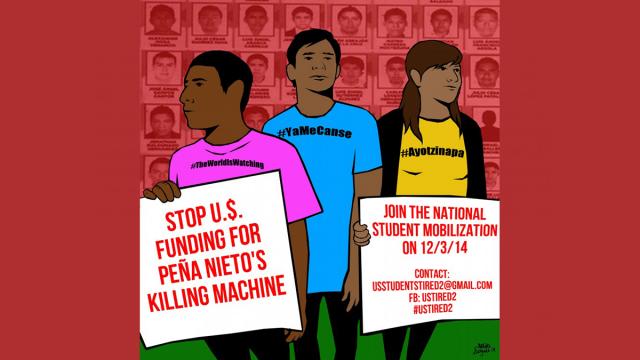
Activists in the United States planned to march in more than 50 cities Wednesday promoting peace as an alternative to Mexico’s so-called war on drugs — the latest in a series of rallies demanding justice for 43 Mexican students who were disappeared after police opened fire on a protest in Guerrero state in September.
"We're turning our attention to what we can do as people living in the U.S.," Monica Novoa, a spokeswoman for #USTired2, a group aimed at ending U.S. aid to Mexican security forces, told Al Jazeera. "We know that billions have gone to the drug war and that this money goes to security forces. And in that way the U.S. is complicit in what's happening in Mexico."
Thousands were expected to march in front of federal buildings — including in New York City, Los Angeles, and Ferguson, Missouri — to call on President Barack Obama and Congress to stop sending billions of tax dollars for military aid and training to Mexican security forces, which have perpetuated human rights violations, Novoa said.
Mexico escalated its war on drugs in 2007, when former President Felipe Calderón dispersed roughly 20,000 federal police and soldiers across the country in a large-scale war against organized crime — with financial aid from the U.S. under the Merida Initiative. That offensive left roughly 100,000 dead and over 25,000 disappeared between 2007 and 2011.
Though rampant violence has continued in Mexico in recent years, with at least 10,000 killed since President Enrique Peña Nieto took power in 2012, the disappearance of the 43 students from a rural teachers training college has convulsed Mexican society and sparked protests not seen in generations. Protesters flooded streets across the country, criticizing Pena Nieto's response to the crime and called for him and his cabinet to resign.
Classmates, relatives and supporters of the missing students from Ayotzinapa Normal School in Mexico’s poverty-stricken Guerrero state have flooded streets across the country since the disappearances. They blame the Peña Nieto administration for the crime, with protesters often holding banners reading, “Fue el estado” or “It was the state.”
Confessions from dozens of police officers and drug gang members arrested after the disappearance have suggested that a corrupt local mayor and his wife in Iguala, Guerrero, ordered the crackdown on the students. Local police then handed over the students to a local gang, ordering their executions, it is alleged.
On Wednesday, #USTired2 activists were to host a series of vigils and conferences in solidarity with the Ayotzinapa students. Hundreds of U.S. protestors already marched in New York City last month, from the Mexican consulate in midtown Manhattan to the United Nations headquarters.
U.S. activists say aid to Mexico’s security forces is illegal under U.S. law. Human rights provisions under the “Leahy Law” male it illegal for the State Department or Department of Defense to provide military assistance to “any unit of the security forces of a foreign country if the Secretary of State has credible information that such a unit has committed a gross violation of human rights,” the group said in a press release.
The Ayotzinapa student disappearances are not the only example of human rights abuses by Mexican security forces that would outlaw U.S. military aid to the country, activists say. Mexican soldiers were accused of executing 22 suspected criminals in a warehouse in the town of Tlatlaya, near Mexico City, in June.
Peña Nieto’s handling of the case has come under close scrutiny. While the army said the incident took place following clashes with criminals, witnesses have testified that it was a massacre.
International rights groups have deplored the state of impunity surrounding these crimes. And a series of mass graves discovered in the search for the 43 missing students has further revealed Mexico’s recent history with violent crime.
In a memorandum to Pena Nieto earlier this year, Amnesty International accused the president of prioritizing economic and political reforms while ignoring human rights.
“Reports of human rights abuses committed by police and security forces, including enforced disappearances, torture, and arbitrary detention continue and impunity for all crimes remains the norm … the justice system continues to fail victims, accused and society.” said Amnesty in a statement. “Mexico continues to face serious challenges to the rule of law and respect for human rights.”
3 WAYS TO SHOW YOUR SUPPORT
- Log in to post comments














